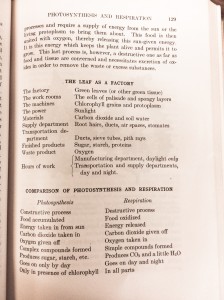An Academic New Year's Resolution list:
For 2015, 101 Big And Small Ways To Make A Difference In Academia http://t.co/DCBuVYWyLo
— Conditional Accept (@conditionaccept) January 7, 2015
In my experience, what I do remains a mystery to most people both within and outside of Higher Education. When they were young, my daughters told me that my job seemed to be "talking". Yes, that's part of it, but technically, my job as a Biology professor has 3 areas: Teaching, Research and Administration and it's not all talking (me below, talking again, about tree seedlings this time). 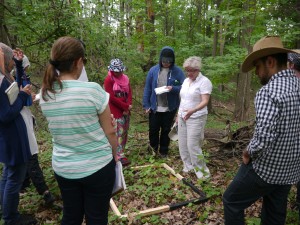 Many of the numbers in this summary list are minimum values. And, they're not the only tasks and projects that I did in 2014. I wasn't going for a comprehensive list, so it doesn't include stuff like journal and grant reviewing, which are huge time sinks. For that, I'd need to go through my 60 page curriculum vitae which I dislike perusing and updating: simply reading it makes me tired. But, we need to keep looking on the bright side, so: TEACHING & MENTORING Lecture Courses taught: 4 (3 undergraduate & 1 graduate) Total number of students finishing the courses: 78 Biology 4000 Undergraduate Honours Thesis Students supervised: 7 Number of other courses where I gave a guest lecture or co-taught: 5 Number of workshops where I spoke or mentored students: 2 Number of graduate students supervised: 3 Number of PhD, Master's & Undergraduate thesis defences attended: I refuse to think about them. They take up ginormous amounts of preparation time. Favourite teaching moment: This tweet by @lucas_colantoni
Many of the numbers in this summary list are minimum values. And, they're not the only tasks and projects that I did in 2014. I wasn't going for a comprehensive list, so it doesn't include stuff like journal and grant reviewing, which are huge time sinks. For that, I'd need to go through my 60 page curriculum vitae which I dislike perusing and updating: simply reading it makes me tired. But, we need to keep looking on the bright side, so: TEACHING & MENTORING Lecture Courses taught: 4 (3 undergraduate & 1 graduate) Total number of students finishing the courses: 78 Biology 4000 Undergraduate Honours Thesis Students supervised: 7 Number of other courses where I gave a guest lecture or co-taught: 5 Number of workshops where I spoke or mentored students: 2 Number of graduate students supervised: 3 Number of PhD, Master's & Undergraduate thesis defences attended: I refuse to think about them. They take up ginormous amounts of preparation time. Favourite teaching moment: This tweet by @lucas_colantoni
#Biol4090 is disrupting my memorize and forget cycle, I never knew you had to actually learn in University... — Lucas Colantoni (@lucas_colantoni) January 15, 2014
Favourite teaching image: I chose one from each of my three undergraduate lecture courses (I took photos of each group of students before they gave their lectures in Applied Plant Ecology). 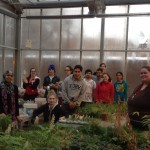

 RESEARCH Number of journal articles and book chapters published: 4 Number of books edited or co-authored: 2 Number of conferences that I or students attended: 8 Number of conferences at which I or students presented: 7 Number of research grants that I applied for in 2014: 1... because I had applied for 7 in the previous 3 years and only received 1. Such is the craziness of the current grant situation. I'll be working on publishing existing data for a while in order to avoid the grant crunch and the York University research administration. Favourite research moment: This tweet by @noah_reisenbach who finally, after searching for evidence of overwintering red lily beetles for 2 months, found 2.
RESEARCH Number of journal articles and book chapters published: 4 Number of books edited or co-authored: 2 Number of conferences that I or students attended: 8 Number of conferences at which I or students presented: 7 Number of research grants that I applied for in 2014: 1... because I had applied for 7 in the previous 3 years and only received 1. Such is the craziness of the current grant situation. I'll be working on publishing existing data for a while in order to avoid the grant crunch and the York University research administration. Favourite research moment: This tweet by @noah_reisenbach who finally, after searching for evidence of overwintering red lily beetles for 2 months, found 2.
New home for the winter. @dawnbazely pic.twitter.com/ObWDAJsuQl — Noah (@N_Riesenbach) December 24, 2014
Favourite research image: When the poster by students from my lab was selected for the semi-finals of the poster competition at the International Biocuration Conference in Toronto!
All prepared for poster session right after the workshop! #ISB2014 @YorkUScience @dawnbazely pic.twitter.com/M5jh0oRqwN — Netta Untershats (@Nettachka) April 7, 2014
ADMINISTRATION
Number of university administrative committees that I sat on: UGGHH, do I have to think about the endless wasted hours? OK, 5.
Number of external committees and boards that I sit on as an Expert in my field: 3
Number of science communication interviews with CBC and other media: >>10
Favourite ones: People Behind the Science interview, with Dr. Marie McNeely and CBC's Quirks & Quarks Open House, explaining Biodiversity
Number of references written for former post-docs, graduate students and current students applying for jobs as professors or otherwise, scholarships, graduate programmes etc. etc.: >50
Number of prestigious awards for which I nominated colleagues & students: 5
Favourite administration moment:
Hearing that Dr. Scott Tarof (blue shirt, below), for whom I prepared the nomination, had won the Faculty of Science Teaching Award for Teaching Assistants.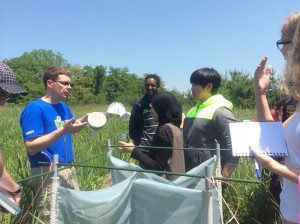
Favourite administration image: After 8 years having my primary office in other locations, while tidying up my lab. I found lots of forgotten cool stuff, like this really old botany book.
LOW points:
MOST AMUSING:
Number of emails with questions about university administration that I sent to Deans, VPs etc. that were answered promptly: 1
(probably because it contained a promise to publicly reveal the number of unanswered emails with the same question to these same administrators if I didn't hear from them. This suggests to me that they're reading my emails, but choosing to ignore them. My emails aren't trivial or frequent; I'm usually raising serious questions that have broad implications for the university, its reputation and its economic efficiency and effectiveness.)
The LOWEST:
Resigning as Director of IRIS (Institute for Research and Innovation in Sustainability) two months prior to the end of my 4th term, totalling 7 years of institution-building for collaborative, team research, when it became clear that the Vice-President of Research and Innovation intended to ignore a supposedly arm-length external review process (which had already been constantly "adjusted" during the charter renewal process by various York senior administrators).
But, when life gives you lemons (I mean unsupportive university administrators) you make lemonade. My chapter about the history of IRIS, and general governance at York University around Sustainability, has passed a competitive peer-review process and been accepted for a book about the politics and governance of sustainability in higher education.
The SECOND-LOWEST point: 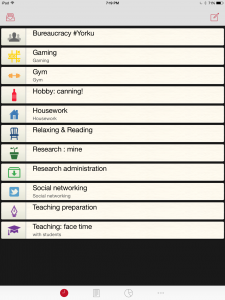
Buying an app to track the amount of time spent on bizarre bureaucracy.
As I segued back into being your common or garden Biology professor, I continued to encounter pointless, make-work bureaucratic interventions and hurdles in non-IRIS dimensions of my daily work. At one point, I felt pressured to resort to sending an email reminding administrative, non-academic staff, that the university exists to do teaching and research. If administrative staff from Deans to clerical aren't supporting me in some clearly measurable way in that mission, then, in my opinion, there's a case to be made for a conversation about precisely why they have their particular job and salary. I have encouraged all of the students that I teach to check out the Ontario Sunshine Law Salary List. (I'm on there, too, along with various people for whom I have never been able to figure what exactly their contribution is to the broad support of my, my students' academic lives, or to York University in general, and its mission to make higher education a public good, or to the "knowledge ecosystem" of academe).
Eventually, to get a grip on the endless bureaucratic time-wasting into which I was being sucked, I BOUGHT a time-tracking app called aTracker PRO. This has helped me, for example, to calculate the amount of time that I am spending on tasks such trying to arrange for rooms to host visiting seminar speakers from Harvard (4 hours).
But again, there's the lemonade option: my experience with the rise of the administrators and audit culture run amok has resulted in invitations to contribute analysis articles to various journals.
Dawn Bazely

